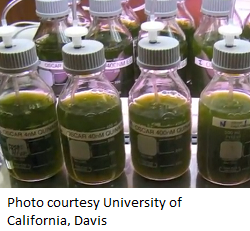 Researchers have found that some of the compounds in green tea could lead to more biodiesel production. Scientists at the University of California, Davis found several compounds, including common antioxidants such as epigallocatechin gallate, found in green tea, and butylated hydroxyanisole (BHA), a food preservative, boosted the oil production by green microscopic algae:
Researchers have found that some of the compounds in green tea could lead to more biodiesel production. Scientists at the University of California, Davis found several compounds, including common antioxidants such as epigallocatechin gallate, found in green tea, and butylated hydroxyanisole (BHA), a food preservative, boosted the oil production by green microscopic algae:
“They can live in saltwater, they take sunlight and carbon dioxide as a building block, and make these long chains of oil that can be converted to biodiesel,” said Annaliese Franz, assistant professor of chemistry and an author of the paper.
Franz, graduate students Megan Danielewicz, Diana Wong and Lisa Anderson, and undergraduate student Jordan Boothe screened 83 compounds for their effects on growth and oil production in four strains of microalgae. They identified several that could boost oil production by up to 85 percent, without decreasing growth.
The researchers grew the cultures in culture volumes up to about a pint in size but figure that some of the compounds could be cost-effective when moved up to 12,000-gallon ponds. Plus, the leftover algae mass after the oil is removed still would make a good animal feed.

